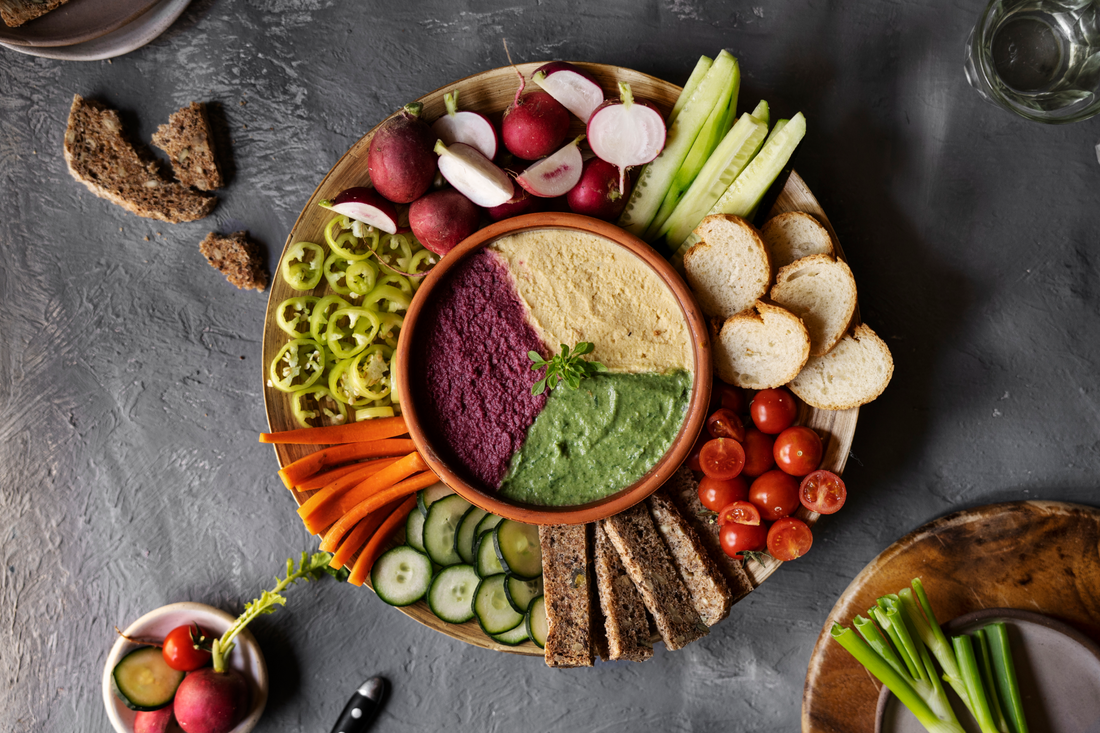
How to Get 75–100g of Protein Daily on a Vegetarian Diet (Without Supplements)
Share
Getting enough protein on a vegetarian diet can seem tricky—especially without relying on protein powders or supplements. But with smart food choices and a bit of planning, you can easily meet your daily protein needs from whole, plant-based sources.
In this guide, we’ll show you how to get 75 to 100 grams of protein per day on a vegetarian diet - without supplements, artificial products, or compromise on taste.
Why Protein Matters in a Vegetarian Diet
Protein is essential for:
- Building and repairing muscles
- Supporting hormones and enzymes
- Boosting metabolism and immunity
- Sustaining energy and satiety
Most adult women need around 50–60g of protein, and men need 60–75g, but those who are active, trying to lose weight, or want to build muscle may benefit from consuming 75–100g per day.
Top 10 High-Protein Vegetarian Foods (Per 100g Cooked Weight)
| Food | Protein (g) |
|---|---|
| Soybeans (boiled) | 16.6g |
| Lentils (dal) | 9g |
| Chickpeas | 8.9g |
| Rajma (kidney beans) | 8.7g |
| Green moong dal | 8.5g |
| Paneer (low-fat) | 18g |
| Tofu (firm) | 12g |
| Quinoa | 8g |
| Peanuts (roasted) | 25.8g |
| Pumpkin seeds | 30g |
These are natural, whole foods that are widely available in Indian kitchens and grocery stores.
Full-Day Vegetarian Meal Plan with 90–100g of Protein
Let’s break it down with a sample daily meal plan that adds up to 90–100g of protein, all from whole, vegetarian foods:
🥣 Breakfast: High-Protein Start (25g)
- 2 Besan + Moong Dal Chillas (10g)
- 1 glass soy or almond milk (unsweetened) (7g)
- Handful of peanuts or seeds (8g)
✅ Protein so far: 25g
🍲 Lunch: Power-Packed Plate (25g)
- 2 Rotis made with high-protein multigrain atta (10g)
- 1 cup Rajma or Chole (9g)
- 1 small bowl curd (5g)
- Side salad with roasted seeds (1g)
✅ Protein so far: 50g
☕ Snack: Smart & Savory (15g)
- Roasted chana (half cup) (7g)
- 1 boiled egg (optional for ovo-vegetarians) or 30g paneer/tofu (8g)
✅ Protein so far: 65g
🍛 Dinner: Light Yet Nutritious (25g)
- 1 cup quinoa khichdi with dal and veggies (12g)
- 1 glass buttermilk (3g)
- Stir-fried tofu with veggies (10g)
✅ Final protein total: ~90–100g
Tips to Maximise Protein Intake on a Veg Diet
-
Mix grains and legumes
Pairing rice with dal or roti with chole creates a complete protein with all 9 essential amino acids.
-
Use high-protein flours
Mix khapli wheat, soy flour, chana dal, green moong, and quinoa to create a protein-rich roti base.
-
Snack smart
Carry roasted seeds, sprouts, chana, or homemade protein laddoos to avoid empty-calorie snacking.
-
Include fermented dairy (if not vegan)
Paneer, curd, buttermilk and Greek yogurt are rich in protein and help gut health.
-
Cook with protein-rich add-ons
Add pumpkin seeds, flaxseed, sesame, or nut butters to porridge, chutneys, and smoothies.
Common Myths About Vegetarian Protein—Busted
❌ Myth: You need supplements or meat to get enough protein
✅ Fact: A well-planned vegetarian diet can give you more than enough protein
❌ Myth: Plant proteins are incomplete
✅ Fact: Eating a variety of legumes, grains, and seeds throughout the day gives your body all essential amino acids
Final Thoughts: Protein Isn’t a Problem on a Vegetarian Diet
Reaching 75–100g of protein per day without supplements is completely doable for vegetarians. The key is to prioritize protein-rich foods, plan meals, and diversify sources.
At Rebalance.kitchen, we’re building protein-dense multigrain flours and foods designed to support your health naturally—without shortcuts, chemicals, or confusion. Because your body deserves the best of what nature and tradition can offer.
